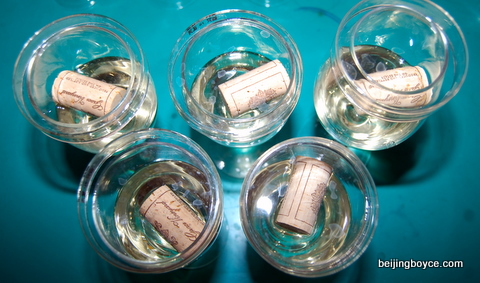
–
By Jim Boyce
There is a good chance Grace Vineyard will use screw caps for part of its upcoming vintage. This strikes me as significant given the stature of Grace, widely considered the success story of the millennium when it comes to quality wine in China, and the dominance of cork and plastic closures in this country.
Before fans of Amorim, Nomacorc and other closure makers go “yes, but…”, I freely admit there can be problems with screw caps, from the technicalities of getting them on just right to issues of wine reduction. Admitted. Freely.
But after more than six years of observations in China it seems to me there are enough challenges in getting decent wine to consumers without piling on more in the form of the poor closures often found in bottle necks. Given such closures, and that with few exceptions any Chinese wine worth drinking is best imbibed young, screw caps are a sensible option. Also, most consumers generally do not know how to use a corkscrew, let alone have one at home, and this makes screw caps less intimidating and more convenient. And some consumers are already familiar with screw caps due to the influx of imported wine from countries such as Australia.
I realize Chinese producers tend to be wedded to things French, and particularly to things Bordeaux, though in most cases they have been unable to consummate the marriage — note all of that thin and tannic red wine stopped with poor closures. Perhaps it is time for a divorce. Or at least a trial separation in order to give screw caps a shot.
Which brings us to Grace. I visited this operation in Shanxi Province about two years ago and spent time in the vineyards, in the cellar, and around the dinner table with the staff and Ma Huiqin, with whom I made the trip. What stuck in my mind most was the screw cap machine we saw.
Ever since, I have been pestering Grace CEO Judy Leisser about that machine. About a week ago, she sent an email that the wines Grace bottled under screw cap earlier this year are doing fine and, if all goes well with final trials, the winery will switch closures this year for its entry level and premium level wines. Grace’s Premium Chardonnay ranks among the better Chinese wines and is found in top hotels and restaurants in Beijing and Shanghai.
Again, I realize that screw caps are not perfect and that other closures might be the right choice for some operations: Grace will still use corks for at least some of its wine, though ones of a higher grade than is found in the typical operation. But this screw cap initiative is a worthy one, not only because it will be fascinating to see how China’s rapidly changing market reacts, but also because it has the potential to inspire other producers to consider their closures and to ultimately get better wine in the hands of consumers.
Grape Wall has no sponsors of advertisers: if you find the content and projects like World Marselan Day worthwhile, please help cover the costs via PayPal, WeChat or Alipay.
Sign up for the free Grape Wall newsletter here. Follow Grape Wall on LinkedIn, Instagram, Facebook and Twitter. And contact Grape Wall via grapewallofchina (at) gmail.com.

Leave a Reply
You must be logged in to post a comment.